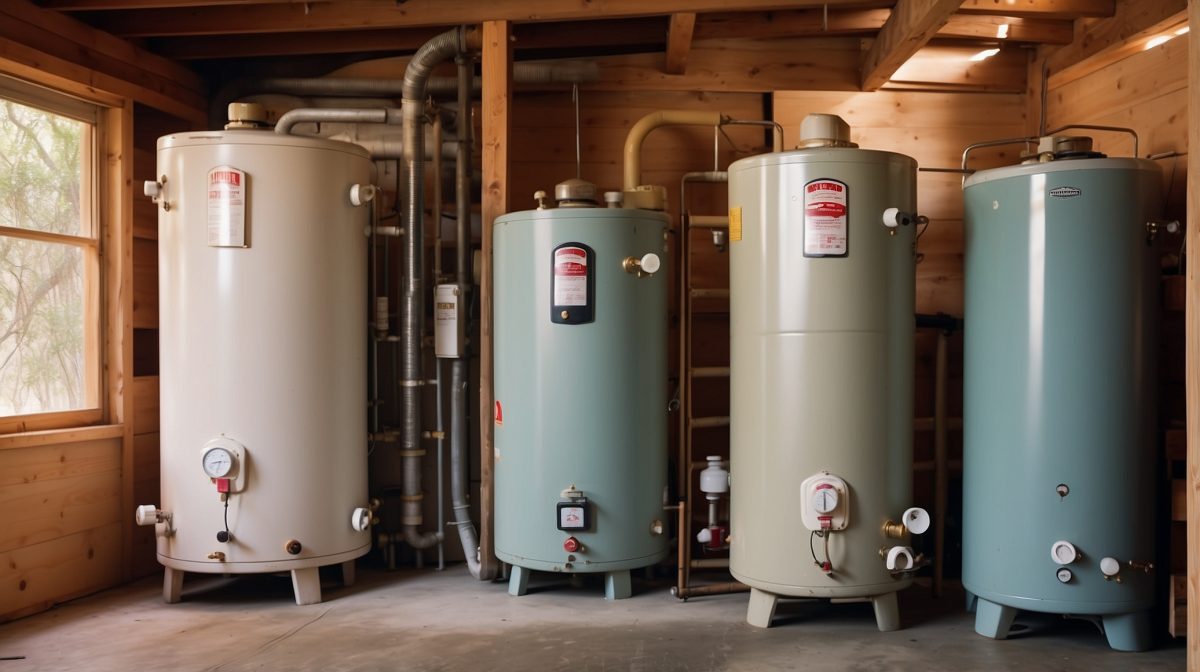Now, y’all know that here in the Hill Country, we value a good balance – like a fine Texas wine. That’s just the way it should be with your water heater. It’s not just about havin’ enough hot water; it’s about havin’ it without wastin’ energy or money. Whether you’re washin’ dishes after a hearty family dinner or takin’ a quick shower before headin’ to the JL Bar Ranch Resort, the size of your water heater matters. So saddle up as we guide you through pickin’ the perfect one for your homestead.
Understanding Water Heater Sizes
Alright, let’s break it down. There are mainly two types of water heaters: tank and tankless. Traditional tank water heaters are like a big ol’ kettle, constantly heatin’ a reservoir of water so it’s ready when you are. They come in various sizes, measured in gallons, and you’ll need to pick one that can handle your family’s daily water wranglin’. On the flip side, tankless water heaters are slicker than a greased pig – they heat water on the fly, as you need it, and they’re measured by flow rate (that’s gallons per minute, folks).
Now, for a tank water heater, capacity is king. Think of it like how much feed you need for your livestock – you gotta have enough to go ’round. If you’re leanin’ towards a tankless model, the flow rate’s your golden ticket. It tells you how much hot water can gush out at once, like how fast your creek flows after a good rain. Either way, gettin’ the size right means you won’t be left out in the cold, nor will you be payin’ to heat water you ain’t usin’.
Factors to Consider When Choosing a Water Heater Size
Now, when it comes to pickin’ the right size water heater, there are a few things you gotta mull over. First off, count the number of folks under your roof. More people means more showers, more dishes, and more laundry – all addin’ up to a need for more hot water. Then, think about your water usin’ habits. Do y’all enjoy those long, steamy showers, or are you the in-and-out type? And don’t forget about peak hour demand – that’s the time when everyone’s clamorin’ for hot water at once, like in the mornin’ when the roosters are crowin’.
Let’s not overlook the climate here in the Texas Hill Country. Though we’re blessed with fairly mild weather, the winters can get nippy, and that affects how hard your water heater has to work. If you’re livin’ out in the sticks, you might have different challenges, like water supply and quality, to consider too. So, puttin’ some thought into these factors will steer you towards the right choice faster than a jackrabbit on a date.
Sizing Guidelines for Tank Water Heaters
For those of y’all considerin’ a tank water heater, there’s a handy rule of thumb: reckon about 10-15 gallons per person in your household. So, if you’re a family of four, a 40 to 60-gallon tank might just do the trick. But remember, this ain’t a one-size-fits-all situation – it’s more like pickin’ out the right-sized boots. Too small, and your toes will be pinchin’; too big, and you’ll be sloshin’ around. Just right, and you’ll be as comfortable as a cow in tall grass.
Let’s say you’re a couple of newlyweds – a cozy 30-gallon tank could be ample. But if your family’s growin’ like a Texas oak, you might need to bump it up to 50 gallons or more. And for those big gatherings or if you’ve got a bunch of kin stayin’ over, you might even need to go higher. It’s all about matchin’ your water heater to your family’s size and splashin’ habits.
Sizing Guidelines for Tankless Water Heaters
Now, if a tankless water heater’s what you’re after, you’ll need to do a bit of figurin’ to calculate the flow rate. Start by addin’ up the gallons per minute each appliance uses and tally the ones you’re likely to run simultaneously. It’s like plannin’ a barbecue – you gotta make sure there’s enough grub to go ’round for everyone at the same time. If your shower’s flowin’ at 2 gallons per minute and you’re runnin’ the dishwasher at the same time, you’ll need a water heater that can handle at least that combined flow rate.
Here’s how you do it step-by-step: list out your appliances and their flow rates, add ’em up based on what you’ll use together, and voila – that’s your magic number. For a typical Hill Country home, you might be lookin’ at a flow rate of around 5 to 7 gallons per minute. But remember, this ain’t a spitballin’ contest – gettin’ the flow rate right means no one gets a cold surprise in the shower.
Energy Efficiency Considerations
Now, we Texans are no strangers to hard work, but there ain’t no sense in workin’ harder than we have to – same goes for our water heaters. Energy efficiency is as important as a good fence on a ranch. Tank water heaters keep a whole vat of water hot all day long, which can be a bit like leavin’ the gate open – wasteful. Tankless models, though, they’re like a latched gate – they only heat water as it’s needed, savin’ you energy and money.
Here in the Texas Hill Country, we like our appliances like we like our barbecues – efficient and effective. A correctly sized water heater, whether it’s tank or tankless, won’t just keep you from freezin’ during your morning routine; it’ll also keep your energy bills lower than a rattlesnake’s belly. And that means more cash in your pocket for enjoyin’ all the amenities at places like the JL Bar Ranch Resort, or wherever your boots take you.
Special Considerations for Texas Hill Country Homes
Now, those of us livin’ out here in the Texas Hill Country, we’ve got some unique considerations when it comes to water heaters. If you’re out in a rural area, your water supply might be as unpredictable as a summer storm. And let’s not forget about the hard water we’ve got in these parts – it can be tougher on a water heater than a bull in a china shop. That’s why it might be wise to pair your water heater with a water softener, to keep things runnin’ smoother than a well-oiled saddle.
And consider this: the right water heater can make all the difference in dealin’ with our local water conditions. You’ll want somethin’ that can stand up to the minerals and sediment without wearin’ out faster than a pair of cheap boots. So, when you’re pickin’ out your new water heater, make sure it’s up to the task of handlin’ our Hill Country quirks.
Conclusion
Well, folks, we’ve covered a lot of ground today, like a cowboy on a long cattle drive. Remember, choosin’ the right size water heater for your Texas Hill Country home is as important as pickin’ the right horse for the trail. It’s all about comfort, efficiency, and gettin’ the most bang for your buck. Whether you go with a tank or tankless model, keep in mind your household size, water usage habits, and our local climate and water conditions.
So, take what you’ve learned here and apply it to your homestead. With the right-sized water heater, you’ll be enjoyin’ hot showers and clean dishes without wastin’ energy or money. And that’s somethin’ to tip your hat to. Y’all take care now, and happy water heatin’!
FAQs
How often should I replace my water heater in Texas Hill Country?
Well now, that depends on a few factors, including the type of water heater and the quality of your water. Generally speakin’, tank water heaters last about 8-12 years, while tankless ones can go for up to 20 years with proper maintenance.
Do I need a special water heater if I have hard water?
Yessir, hard water can be a real pain for water heaters. It’s a good idea to look for models that are designed to resist corrosion and scale buildup or consider installin’ a water softener to protect your investment.
Can I install a larger water heater than I need just to be safe?
Now, I understand the temptation, but gettin’ a water heater that’s too big can lead to unnecessary energy costs. It’s best to size it just right for your household’s needs.
Is it worth switchin’ to a tankless water heater in the Texas Hill Country?
Well, that depends on your specific needs and situation. Tankless water heaters can be more efficient ’cause they only heat water on demand, but they’re also a bigger upfront investment. Do your homework before makin’ the switch.
How does the Texas Hill Country climate affect my water heater needs?
Around these parts, we have a pretty mild climate, but it can get chilly in the winter. You’ll want to make sure your water heater is insulated properly and sized appropriately to handle those colder snaps without breakin’ a sweat.


